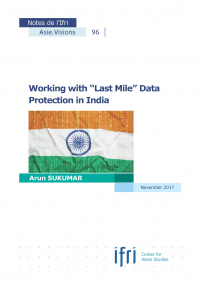Gateway to Think Tanks
| 来源类型 | Publications - Policy Papers - Asie Visions |
| 规范类型 | 简报 |
| DOI | 978-2-36567-792-9 |
| Working with “Last Mile” Data Protection in India Asie.Visions, No. 96, November 2017 | |
| Arun SUKUMAR | |
| 发表日期 | 2017-11-30 |
| 出处 | Asie Visions |
| 出版年 | 2017 |
| 概述 | India’s digital economy is characterized by “last mile” data protection, with privacy norms, data collection and sharing standards being set at the level of the application (“app”), operating system (OS) and the device. This practice lends itself to multiple, often crisscrossing rules... |
| 摘要 |
Working with “Last Mile” Data Protection in India Asie.Visions, No. 96, November 2017
India’s digital economy is characterized by “last mile” data protection, with privacy norms, data collection and sharing standards being set at the level of the application (“app”), operating system (OS) and the device. This practice lends itself to multiple, often crisscrossing rules maintained by smartphone manufacturers, mobile operating system vendors and application developers. The user is caught in a maze of privacy policies that bear on important questions: what data is collected, where it is stored, who it is shared with, and legal recourse in the face of policy violations or unauthorized use of data by third parties.  Contributing to the confusion is the lack of statutory or regulatory clarity on data protection. India’s own data protection rules offer wide latitude to technology companies to determine their own practices, which encourage irregular and poorly enforced privacy policies. If regulatory ambiguity has opened the door for conflicting data protection guidelines, the problem is compounded by India’s heavy reliance on foreign devices and applications, many of which transfer data of Indian users outside India’s borders and base their privacy policies on their home jurisdictions. This system of “last mile” data protection significantly diminishes the state’s ability to protect the privacy of its citizens, a right that was recently confirmed as “inalienable” by the Supreme Court of India. This paper highlights “last mile” protection through an analysis of policies at the app, OS and device layer — using the examples of the Google Play Developer Distribution Agreement, Google Developer Policy, the India-specific privacy policies of smartphone manufacturers Huawei, Vivo and Xiaomi, as well as the privacy policy of WhatsApp. While acknowledging that such policies are here to stay and that it may not be feasible to craft statutory guidelines that comprehensively address every dimension of data sharing and collection, given the diversity in technological platforms, the paper makes the case for a self-regulating, autonomous and multi-stakeholder agency for protecting the integrity of user data.
Working with Last Mile Data Protection in India
|
| 关键词 | Cybersecurity Asia India |
| URL | https://www.ifri.org/en/publications/notes-de-lifri/asie-visions/working-last-mile-data-protection-india |
| 来源智库 | French Institute of International Relations (France) |
| 引用统计 | |
| 资源类型 | 智库出版物 |
| 条目标识符 | http://119.78.100.153/handle/2XGU8XDN/416336 |
| 推荐引用方式 GB/T 7714 | Arun SUKUMAR. Working with “Last Mile” Data Protection in India Asie.Visions, No. 96, November 2017. 2017. |
| 条目包含的文件 | ||||||
| 文件名称/大小 | 资源类型 | 版本类型 | 开放类型 | 使用许可 | ||
| couv_av96.jpg(28KB) | 智库出版物 | 限制开放 | CC BY-NC-SA |  浏览 | ||
| sukumar_data_protect(988KB) | 智库出版物 | 限制开放 | CC BY-NC-SA | 浏览 | ||
除非特别说明,本系统中所有内容都受版权保护,并保留所有权利。